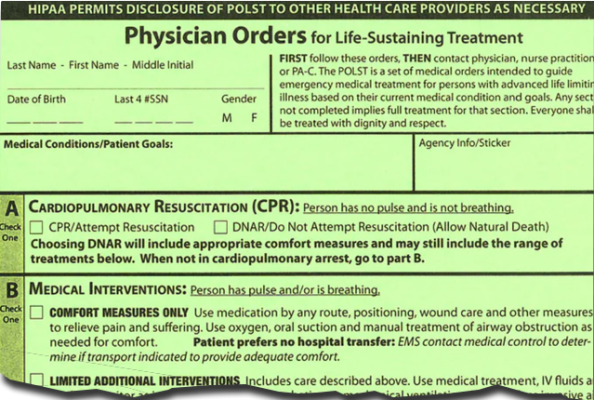
The top of Washington state's Physician Orders for Life Sustaining Treatment form. Graphic courtesy of Washington State Hospital Association
August 16, 2022 — A study of cardiology programs indicates that patients’ documented do-not-resuscitate (DNR) preferences are often suspended while they undergo transcatheter aortic valve replacement (TAVR) procedures. Moreover, the duration of DNR suspensions varied markedly across heart programs, and only 26% of the programs studied had formal policies governing clinicians’ responsibilities in these consequential decisions.
“One great strength of cardiology is that the field relies strongly on research, including randomized controlled trials and outcomes studies, to determine the best ways to treat disease. So it was very surprising to see such variability in clinical decision-making among the programs we studied,” said Dr. Gwen Bernacki, an assistant professor of cardiology at the University of Washington School of Medicine.
It is reasonable to think that many patients are unaware that their DNR preference may be overridden, said Dr. Gwen Bernacki.
Bernacki, who also is affiliated with the VA Puget Sound Health Care System, was the paper’s lead author. It was published Aug. 10 in the Journal of the American Geriatrics Society.
The authors concluded that the collective findings highlight the stark need for cardiology practices and hospitals to standardize DNR policies for peri-procedural patients. Policies and practices must ensure that patients, their families and their medical teams communicate to ensure that everyone understands what response will occur if life-threatening circumstances emerge, Bernacki added.
The research was conducted via interviews with TAVR coordinators at 52 programs across Washington and California. Most programs (78%) suspended patients’ DNR status until after the procedure, but times of reinstatement differed: 38% were within 48 hours, 44% were at time of patients’ discharge, and 18% did not happen until 30 days or more post-procedure. Only six programs maintained patients’ DNR desired status while performing TAVR. Four programs described no consistent practice, and one program would not consider patients with DNR status.
In discussing why programs might require that patients’ documented wishes be set aside, Bernacki explained that interventional cardiologists are motivated to achieve successful outcomes not only for their patients, but also for their programs. Patient mortality data, collected in national outcome registries, negatively affects program metrics.
While the actual instance of patients “coding,” or requiring resuscitation attempts, during TAVR procedures is quite low, Bernacki said, it is reasonable to think that many patients are either unaware that their DNR preference may be overridden or may not fully understand which specific circumstances could lead to a decision to start CPR.
“This is significant because TAVR volumes will continue to grow because of the procedure’s minimally invasive nature and because severe aortic stenosis is common among older people. People are living longer, often with more chronic conditions. So more older patients — the ones likely to have DNRs — will want this procedure.”
The authors noted that current guidelines for TAVR procedures do not address standardization of DNR policies and that, by contrast, guidance from the American Society of Anesthesiologists and American College of Surgeons states that automatic suspension of DNR status conflicts with patients’ rights to self-determination.
Bernacki suggested that a standardized, patient-centered guidance document could be generated by a governing group with input from interventional cardiology, anesthesia, geriatrics, palliative care, emergency medicine, patients and families.
“Standardizing doesn't mean you can't have some flexibility and deliver care that is truly person-centered. But it means that the approach you take with patients is the same at hospitals across the country. Patients should be a part of a process that most people think is reasonable, and certainly not one that is at the least, on the surface, somewhat random.”
Future studies present an opportunity to examine the expectations of patients and families regarding policies that govern DNR decisions during peri-procedural windows, she added.
For more information: http://uwmedicine.org


 February 03, 2026
February 03, 2026 









